Titus Immanuel 2022 -
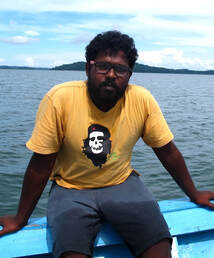
I grew up in the outskirts of Chennai and spent most of my childhood running behind anything that had life and moved. I was fascinated by the amazing shapes and colours animals came in and would spend hours observing their behaviour. I was first introduced to coral reefs during my Master’s degree in the Andaman Islands. And from then on I knew that working in the coral reef ecosystems would be a big part of my life.
I worked in the coral reef habitats of the Andaman and Nicobar Islands, with a major focus on biodiversity documentation and reef health monitoring. I studied the diversity of sponges in the Andaman and Nicobar Islands for my PhD thesis and documented a number of new locational records in the Islands. After my PhD , I worked on a long term coral reef monitoring programme in the Lakshadweep Islands. My current work at CES is to understand the effects and implications of climate change in the reef ecosystems of the Andaman Islands. I am new to Bangalore so I hope to spend my spare time exploring the city and its wildlife on my bicycle.
I worked in the coral reef habitats of the Andaman and Nicobar Islands, with a major focus on biodiversity documentation and reef health monitoring. I studied the diversity of sponges in the Andaman and Nicobar Islands for my PhD thesis and documented a number of new locational records in the Islands. After my PhD , I worked on a long term coral reef monitoring programme in the Lakshadweep Islands. My current work at CES is to understand the effects and implications of climate change in the reef ecosystems of the Andaman Islands. I am new to Bangalore so I hope to spend my spare time exploring the city and its wildlife on my bicycle.
T. Thinesh 2022 -
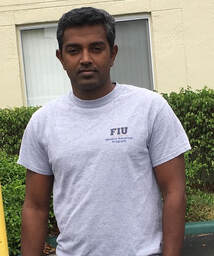
I got introduced to coral reef ecosystems upon completing my master degree in Microbiology, and have been fascinated by it ever since. My doctoral research focused on coral disease ecology, which created baseline information on disease types and prevalence in different coral genera in the Gulf of Mannar and Palk Bay. I worked on coral conservation programmes such as coral bleaching surveys, coral recruitment research, and coral restoration while conducting my dissertation research.
After my Ph.D., I was intrigued to understand the factors determining bleaching susceptibility differences in coral species found during my extensive bleaching survey studies. Through a Fulbright grant, I studied the role of microbiota in coral adaptation to urban environments at Florida International University in Miami. My current research as a CSIR Pool Scientist aims to identify the symbiont types found in Andaman reefs and to understand the role of symbionts in resistance to bleaching episodes, in order to guide restoration and conservation interventions.
After my Ph.D., I was intrigued to understand the factors determining bleaching susceptibility differences in coral species found during my extensive bleaching survey studies. Through a Fulbright grant, I studied the role of microbiota in coral adaptation to urban environments at Florida International University in Miami. My current research as a CSIR Pool Scientist aims to identify the symbiont types found in Andaman reefs and to understand the role of symbionts in resistance to bleaching episodes, in order to guide restoration and conservation interventions.
Vivek Cyriac 2021 -

I have always been fascinated by the sheer diversity of life. Although I have had many hobbies and shifting interests growing up, my fascination for amphibians and reptiles has always stayed. Doing a Masters in Wildlife biology further cemented my interest in exploring diverse questions about the behaviour, ecology and evolution of reptiles and amphibians.
During my Masters, I travelled extensively in Kerala's Western Ghats and got interested in fossorial reptiles. This led me to do a PhD exploring the evolution of fossoriality in snakes at IISER Thiruvananthapuram. My work at IISER revolved around understanding the factors that determine diversification in fossorial reptiles and how they adapt to environmental change focusing on the snake family Uropeltidae (shieldtail snakes). I also studied how defensive behaviours and colourations in these snakes influence diversification. My current work at CES tries to expand on my earlier work. It aims to understand the drivers of cryptic speciation in these snakes. Apart from my research, I enjoy travelling and exploring local cuisines, which I usually combine with some herping on the side.
During my Masters, I travelled extensively in Kerala's Western Ghats and got interested in fossorial reptiles. This led me to do a PhD exploring the evolution of fossoriality in snakes at IISER Thiruvananthapuram. My work at IISER revolved around understanding the factors that determine diversification in fossorial reptiles and how they adapt to environmental change focusing on the snake family Uropeltidae (shieldtail snakes). I also studied how defensive behaviours and colourations in these snakes influence diversification. My current work at CES tries to expand on my earlier work. It aims to understand the drivers of cryptic speciation in these snakes. Apart from my research, I enjoy travelling and exploring local cuisines, which I usually combine with some herping on the side.
Tejal Vijapure 2020 -
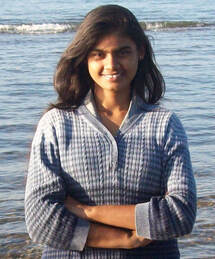
I have always had an interest in the field of marine biology. During the years of my graduation and post-graduation, I developed a special inclination towards this subject. Beach surveys during the MSc project inculcated an interest in benthic invertebrates. Working experience in the benthic ecology lab of CSIR-National Institute of Oceanography (NIO), Regional Centre, Mumbai, provided a firm foundation and took me a step closer towards the research area of macrobenthic ecology. The world of worms fascinated me the most.
For my. PhD, I studied the macrobenthic community structure of the northwest Indian coast focusing on structural, functional as well as genetic characterization of the polychaete fauna. I continue to work on the polychaete taxonomy. I hope to contribute to our understanding of the ecological drivers that influence this key macrobenthic taxon at different scales. I am a music lover who enjoys listening, singing along and dancing. I occasionally spend leisure time painting.
For my. PhD, I studied the macrobenthic community structure of the northwest Indian coast focusing on structural, functional as well as genetic characterization of the polychaete fauna. I continue to work on the polychaete taxonomy. I hope to contribute to our understanding of the ecological drivers that influence this key macrobenthic taxon at different scales. I am a music lover who enjoys listening, singing along and dancing. I occasionally spend leisure time painting.
Harikrishnan S. 2020 -2023
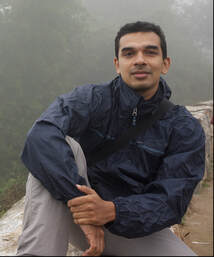
I have been interested in reptiles and amphibians for as long as I can remember. Since 2006, I have carried out herpetological and ecological studies in the Western Himalayas, the Western Ghats, eastern India, and the Andaman & Nicobar Islands. As part of this, for my PhD thesis, I focused on the lizard communities in these islands, exploring patterns of species co-occurrence, species-abundance distributions, and body size distributions in local and regional communities. I started that study focusing on the idea of the ecological niche, and ended with a deeper appreciation for the role of historical and biogeographic processes on shaping communities.
My current work with the Long-term Ecological Observatories (LTEO) programme aims to establish a monitoring programme for herpetofauna across India, which will help us detect changes in amphibian and reptile communities in response to global climate change. My other interests are photography and travelling to wild places, but usually only to places where I can go ‘herping’. If I am not doing any of this, it means I am probably working on my Jiu-Jitsu skills, which has become my other passion in life.
My current work with the Long-term Ecological Observatories (LTEO) programme aims to establish a monitoring programme for herpetofauna across India, which will help us detect changes in amphibian and reptile communities in response to global climate change. My other interests are photography and travelling to wild places, but usually only to places where I can go ‘herping’. If I am not doing any of this, it means I am probably working on my Jiu-Jitsu skills, which has become my other passion in life.
Aniruddha Marathe 2019 - 2023
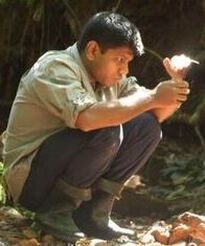
I am interested in geographic gradients in biodiversity and mechanisms that generate these gradients. I am happiest when studying biodiversity patterns of ants, but frogs, trees and birds are also exciting. I followed my first interest during PhD at ATREE and Manipal University, where I worked on ant communities across elevation gradients in the Eastern Himalaya.
The present post-doc at the Center for Ecological Sciences gives me opportunity to pursue my interests with other taxa. Here I am trying to understand processes limiting species distributions and diversity in the Western Ghats. Work by colleagues, and alumni of the lab using frogs, trees and birds as models, suggests that evolutionary history of the Western Ghats along with environmental gradients across the north-south extent together shape patterns in species distributions. I am trying to understand how common or unique are these processes across taxa and how climate change might affect these patterns in the near future. My other interests are in cycling, cooking and rock climbing.
The present post-doc at the Center for Ecological Sciences gives me opportunity to pursue my interests with other taxa. Here I am trying to understand processes limiting species distributions and diversity in the Western Ghats. Work by colleagues, and alumni of the lab using frogs, trees and birds as models, suggests that evolutionary history of the Western Ghats along with environmental gradients across the north-south extent together shape patterns in species distributions. I am trying to understand how common or unique are these processes across taxa and how climate change might affect these patterns in the near future. My other interests are in cycling, cooking and rock climbing.
Rohitashva Shukla 2019 - 2023
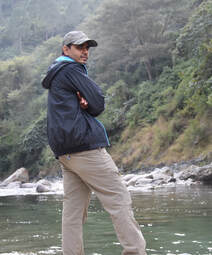
I belong to a place situated along the banks of River Narmada which led to my fascination with nature and specifically freshwater ecosystems. After completing my Masters in Biotechnology, I started my PhD at Indian Institute of Science Education and Research, Kolkata to pursue my passion in fish community ecology. I worked on fish diversity and distribution patterns, and their cause and consequences on freshwater stream ecosystems of Central India. After my PhD, I worked at Wildlife Institute of India, Dehradun, in a National Mission for Clean Ganga (NMCG) funded project and explored the distribution of multiple freshwater taxa in the Ganga River. During my tenure in WII, I also carried out extensive field work in the beautiful Himalayan cold water streams to explore the ecology and diversity of fishes. Currently at Indian Institute of Science, Bangalore as a Dr. D.S. Kothari postdoctoral fellow, I am trying to understand the macroecological patterns of fish species distribution among the river basins of Western Ghats and the underlying mechanisms and processes that drive these patterns in this biodiversity hotspot. Besides research, I am also actively engaged in Indian classical music and Hindi literature. I have learnt a percussion instrument, the tabla, and played it on different notable occasions.
KP Dinesh 2011 - 2015
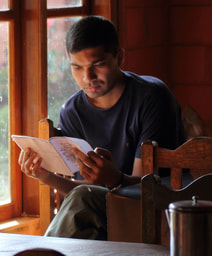
I am from coffee growing communities of the Western Ghats, and started my early research life roaming around the hill ranges of Kudremukh and Mullayanagiri in search of birds and butterflies. After completing doctoral research in coffee genetics, government service provided me an opportunity to kick start my new interest in amphibian taxonomy. In the process of addressing taxonomic issues, I ended up working on phylogenetics, phylogeography and evolutionary history of amphibians of the Western Ghats.
As part of my postdoctoral project in the lab (2011-15), we attempted to examine the extent and patterns of distribution of genetic diversity within the Ranid family of the Western Ghats. We assessed species-wide phylogeographical structuring within the ranid frogs to make inferences about gene flow between geographic locations on the either side of the Palghat Gap in the Western Ghats. We continue to elucidate problems in taxonomy, systematics and delimitation of the species, and are attempting to define the altitudinal and latitudinal range of distribution for ranids and other frogs.
As part of my postdoctoral project in the lab (2011-15), we attempted to examine the extent and patterns of distribution of genetic diversity within the Ranid family of the Western Ghats. We assessed species-wide phylogeographical structuring within the ranid frogs to make inferences about gene flow between geographic locations on the either side of the Palghat Gap in the Western Ghats. We continue to elucidate problems in taxonomy, systematics and delimitation of the species, and are attempting to define the altitudinal and latitudinal range of distribution for ranids and other frogs.
Naveen Namboothri 2008 - 2015
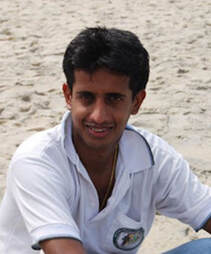
Trained as marine biologist, I have worked in diverse coastal, marine and island systems across India. During my time as a post-doc in the lab., I worked on a range of projects related to marine biology from coral reefs to marine turtles. I also received a DST-SERB Fellowship to work on coral reef recruitment in the Andaman and Nicobar Islands.
I am a founder trustee of Dakshin Foundation and currently serve as its Director. My engagement cuts across regional, national and local agencies including government and non-government sectors. I head the Biodiversity and Resource Monitoring Programme and oversee the establishment and implementation of several marine conservation projects at Dakshin’s field sites such as the community-led fisheries management in the Lakshadweep, citizen science programmes in the Andamans and the long-term monitoring of coral reef ecosystems in the Andamans. I have served on the editorial board of Current Science and am a member to the Aquaculture and Marine Biotechnology Task Force of the Department of Biotechnology, Government of India.
I am a founder trustee of Dakshin Foundation and currently serve as its Director. My engagement cuts across regional, national and local agencies including government and non-government sectors. I head the Biodiversity and Resource Monitoring Programme and oversee the establishment and implementation of several marine conservation projects at Dakshin’s field sites such as the community-led fisheries management in the Lakshadweep, citizen science programmes in the Andamans and the long-term monitoring of coral reef ecosystems in the Andamans. I have served on the editorial board of Current Science and am a member to the Aquaculture and Marine Biotechnology Task Force of the Department of Biotechnology, Government of India.
